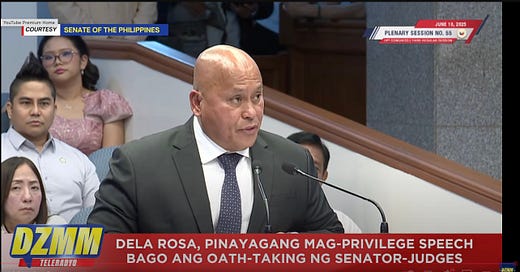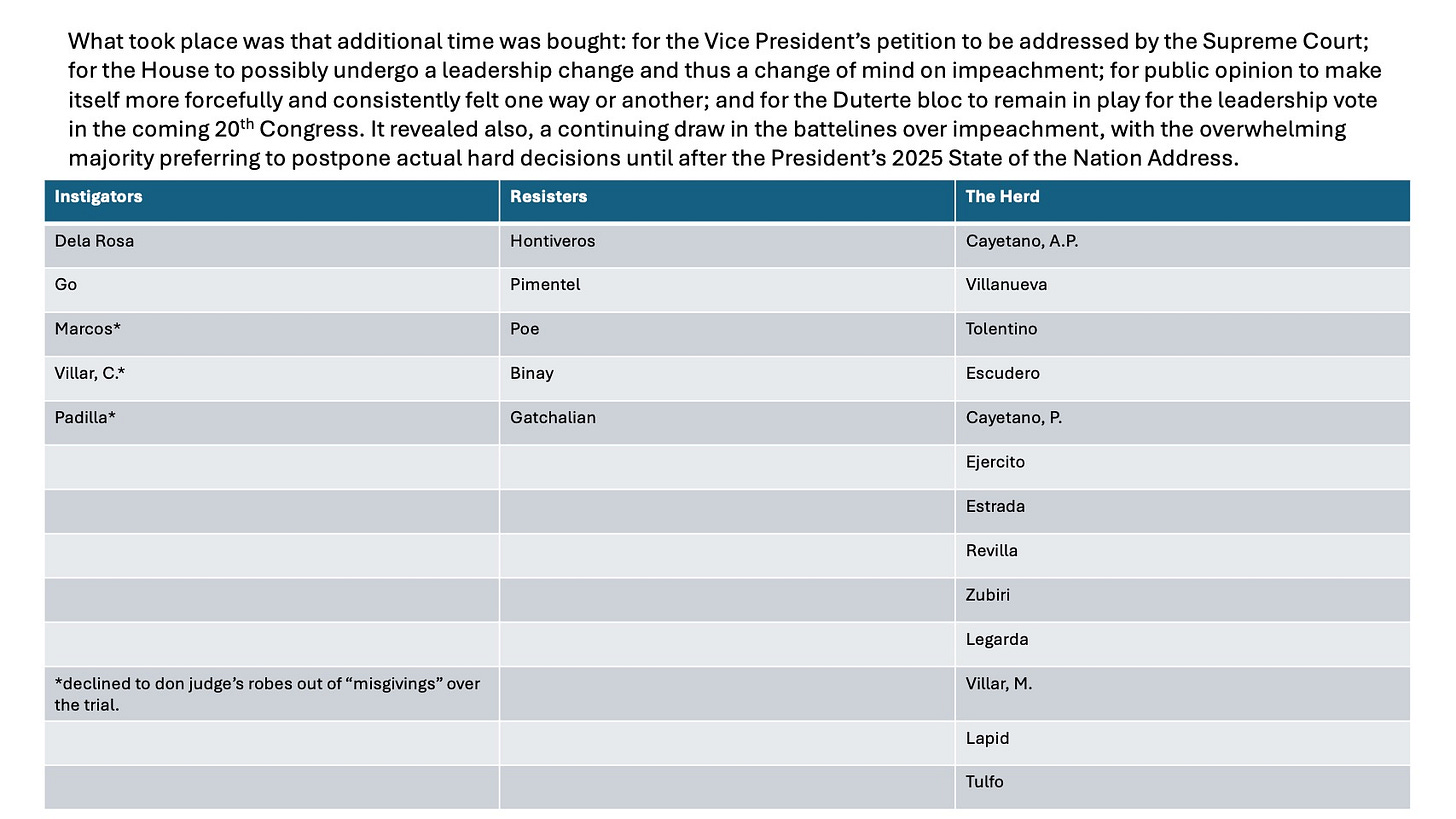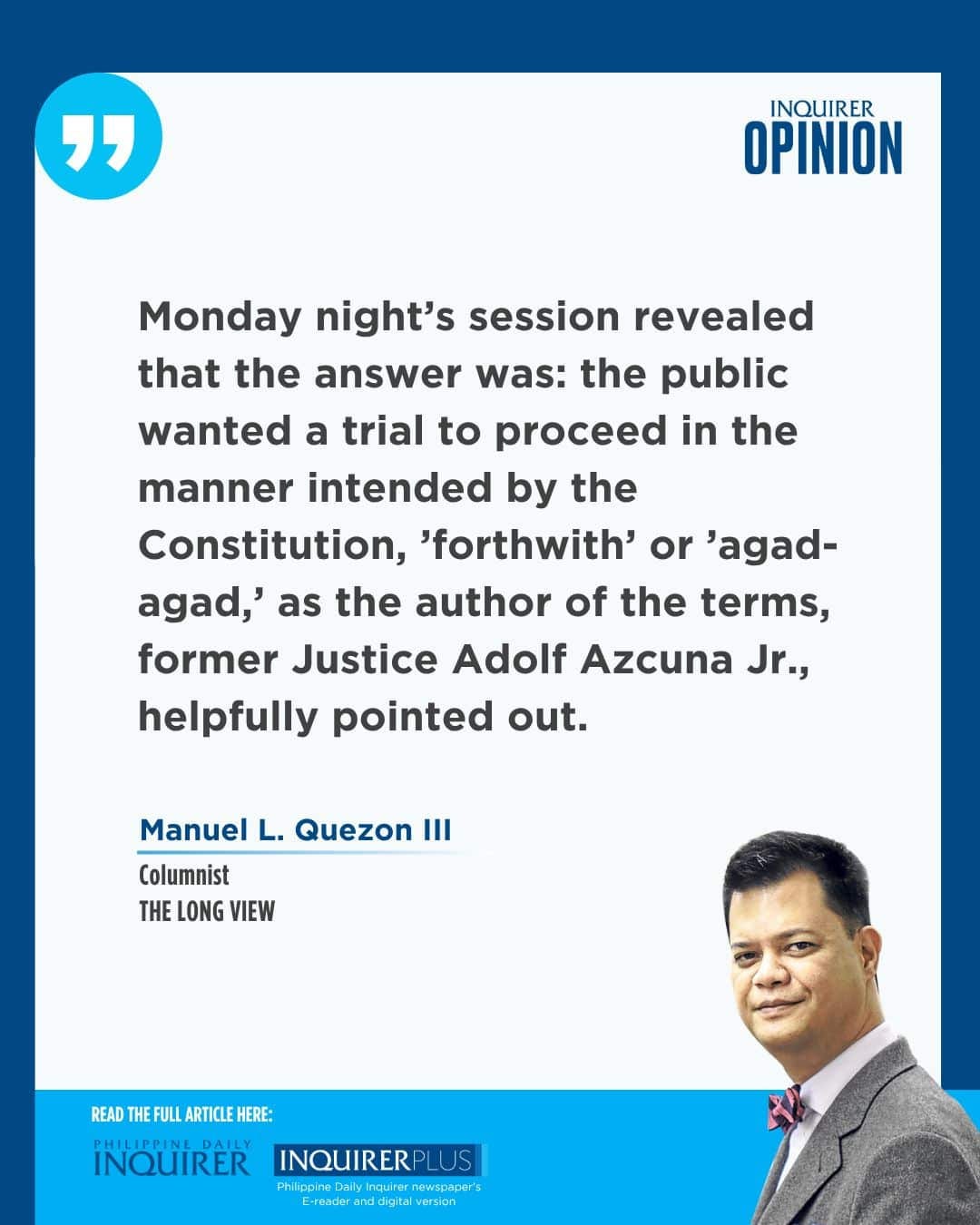
My column this week looked at what happened on Monday and tried to look into would happen yesterday and today.
But first let me share some thoughts on last night's events.
The week began with my sharing my thoughts on how we got to the point where the 19th Congress is about to go into history with the danger of taking the Duterte impeachment with it. In my article in the Asia Sentinel I said it was mainly due to two things: senators being uncertain of where public opinion really lay, and their uncertainty over the dedication of the President to an outcome. See:
What happened was that public pressure finally seems to have convinced senators that further foot-dragging was going to cost them, politically, not to mention the indignity of the country's reputable law schools and other institutions weighing in against continued delays.
What then happened was that having suffered one setback --their inability to muster the votes for an outright dismissal of the case-- the Duterte-oriented senators bought time by asking for the senate's convening as the Impeachment Court to take place over two days instead of instantly.
This set the stage for last night, where Senator dela Rosa used a privilege speech (itself essentially a restating of the legal arguments made by the Vice-President in her pending petition to the Supreme Court, as cover for making a motion to dismiss the charges, one then modified (sort of) by Senator Go, and enthusiastically pursued, succesfully, by Senator Cayetano with the notable interest of Senator Villanueva, to "remand" the articles of impeachment back to the House. Villanueva opened up the possibility of asking the House, when it enters into its duties in the 20th Congress, if it still wants to pursue the case.
A long pointless debate followed. The essential point is that Cayetano refused to grant the House the presumption of regularity. It's a basic principle of government operations that what is done, is presumed to have conformed to the law and is therefore, legitimate. Denying the House this presumption is at the heart of this remanding nonsense: that the Senate can poke its nose into the goings-on in the House when the House can't do likewise to the Senate. Once upon a time if a Senator had so brazenly insulted the entire House in the manner Cayetano insultingly wants to "remand" (demand the House justify itself), someone would have challenged him to a duel or just gone upstairs to kick him in the shins.
This remanding scheme sounds extremely fishy. If they already argue that Constitution does not explicitly give option to reject articles of impeachment how can it be interpreted to allow returning articles to the House? Sen. Hontiveros quoted from the famous Ang Tibay case on "cardinal primary rights" that must be observed and judiciously noted that the ones to give pros and cons on the motion to dismiss are the defense and prosecution, not the senators; so best to ask them first.
Dismissal/Remand/Return all mean the same thing, Pimentel pointed out, saying the Senate can merely issue an advisory to House prosecutors to answer a list of questions propounded by senators.
The questions of Senators Binay and Poe posed to Escudero, underline how correct Pimentel is. They saw no difference between remanding and returning and the implication of rejection. Anyway Escudero said the processes of the trial would proceed to near end June; but at end June, House terms all end, as does mandate of House managers, and any private counsel they've hired; hiatus until new Congress terms start on July 1: in this interim they can demand answers from House.
So dela Rosa's motion was straightforward: to kill the case. Cayetano's motion was to shoot it and send it back to the House to see if the House will nurse it back to health and send it back to the Senate.
Let me point out that much as the herd voted to kick the can down the road by approving "remanding" the articles of impeachment, the main antagonists were evenly divided: There were five votes against remanding: Poe, Hontiveros, Pimentel, Gatchalian, and Binay. While the rest all voted to remand, the five who either directly instigated remanding, or demonstrated their opposition to holding the trial itself, were also five: dela Rosa, Go, and the three who refused to don their senator-judge's robes: Marcos, C. Villar, and Padilla.
This underscores my assertion that the midterms resulted in a draw; that public opinion is thus, not entirely clear to the senators; that the President's resolve is in doubt. This means personal ambitions can flourish --there is a battle over the senate presidency after all-- and any deal can be done extending the status quo, until it can be more clearly seen which side has the public fully behind it.
(Despite some thinking "Lively discourse that enriched the records of the senate" is Escudero-speak for spreading horse manure) the Senate President says they didn't judge the House or reject impeachment, they're just asking questions and intend to proceed with trial procedures.
Upon inquiry by Hontiveros, Escudero pointed out the Impeachment Court has convened, and the court has issued summons to the impeached official; no need anymore for House managers (or prosecutors in our native legislative lingo) to read the articles before the Senate.
On an entirely minor note, I am not so old that I don't remember when Senate Presidents had a sense of decorum and had enough self-discipline not to roll up their sleeves, get up and slouch at the back in the midst of presiding, or snack at the rostrum and then speak with their mouths full.
The ones doing the main moving for SZD were Dela Rosa and Go; Padilla, Marcos, and C. Villar backed them up by visibly challenging the legitimacy of the impeachment court. Escudero, Cayetano, Villanueva skirted the go-for-broke showdown wanted by the SZD clique and instead tried old fashioned squid tactics aimed at the House: the Senate gets to continue going through the motions, but the SZD clique is enticed to be counted in the coming Escudero-Sotto leadership showdown; meanwhile everyone gets to point at the House. Tolentino the lame duck just went along for the ride. See chart.
This Week’s The Long View:
The Long View
‘Arreglado na ang kilay!’
By: Manuel L. Quezon III – @inquirerdotnet
Philippine Daily Inquirer / 05:06 AM June 11, 2025
A reader rewarded my wish to revive this prewar bit of slang by responding to my posting of a picture of Senate President Francis Escudero taking his oath as presiding officer of the impeachment court together with the late Senator Claro M. Recto’s famous remark, “Tapos na ang boksing.” To my delight, the reader responded with that Commonwealth-era expression, “Arreglado na ang kilay!” What a nice caption for the Senate President’s oath-taking shot.
Eighty years to the day after the first nationally elected Senate finally convened in 1945 (after being elected in November 1941, but unable to assume office because of the outbreak of the war), its present-day heir finally came to its collective senses. It was unnecessarily weeks in the making. The Senate had launched a barrage of trial balloons to try to wriggle out of mounting an impeachment trial—or, at the very least, to get a firmer sense of where public opinion actually lay. Monday night’s session revealed that the answer was: the public wanted a trial to proceed in the manner intended by the Constitution, “forthwith” or “agad-agad,” as the author of the terms, former Justice Adolfo Azcuna Jr., helpfully pointed out.
It was enough to leave Sen. Risa Hontiveros not alone at last, but rather in the company of a senator whose swan song—as he bows out of his term—restored his standing: Sen. Aquilino Pimentel III moved that the articles of impeachment submitted by the House be referred to the committee on justice and human rights of the Senate and that the Senate President in turn, take his oath as presiding officer of the impeachment court, and so on. All of this had been preceded not only by a flood of manifestos from concerned academic institutions and civil society but also snapshots of public opinion supportive of a trial; most of all, by the kind of intensity of social media opinion that leaves everyone who encounters it sure that the public has made itself heard.
This was in marked contrast to the voices raised in defense of the Veep: if they’d spoken during the elections, they remained relatively quiet afterward. The only thing quieter than them was the President. If, as everyone seems to agree, the Dutertes don’t take prisoners, then—politically at least (to put it mildly)—the President is a dead man walking.
To review: aside from the Marcos-Duterte tie-in the midterm Senate election, the lack of any clear (public, anyway) indication of where the Palace wanted things to go also fostered senatorial indecision. With all eyes turned to him, the President responded yesterday by answering a reporter’s question (should the impeachment cross over from the 19th Congress to the 20th?) in his typical understated style: “What’s the controversy? It’s obvious that it will.” Chances are, politicians and observers both will leap to the conclusion that this is nothing less than a green light after weeks and weeks of looking toward the Palace for signs of administration resolve to pursue the case.
It fortifies the belief that challenging the trial on the theory that it somehow evaporates between the gaveling into the history of the 19th Congress and the convening of the 20th is such laughably bad law that only non-lawyers dare to even propose it.
So between now and Wednesday, when the senators all take their oaths as senator-judges, where lies a miracle for the Veep? There are, arguably, three arguments her sympathizers can make either in the Senate or before the Supreme Court: the articles of impeachment are defective because: 1. The one-per-year rule was violated because three earlier complaints were archived, arguably making the impeachment the fourth (but they were never disposed of by the House, so never even taken up; never even existed, legislatively speaking); 2. There wasn’t enough vetting by the House committee on justice, which ignores the Constitution’s own fast-track provisions, which enable articles to go straight through to plenary once a threshold of endorsers is met; 3. There was some sort of flaw in the verification of signatures, on the basis that some signed without understanding what they endorsed.
In the words of an experienced lawyer, these objections are “hogwash!” But invoking such tactics has never been about the actual merits; it’s about buying time. It could bog down the proceedings in the Senate before it adjourns or paralyze the process if the Supreme Court accepts a challenge to the proceedings in the Senate. But once constituted as an impeachment court, the proceedings will take on a life of their own. It will be an exercise in which from the moment evidence begins to be revealed by the prosecution, the damage will already have been done, regardless of the verdict. It is a political process, after all. For every senator who is actually more a senator-juror than senator-judge, there are tens of millions of Filipinos empowered to be something they can never be otherwise: jurors in the court of public opinion.





